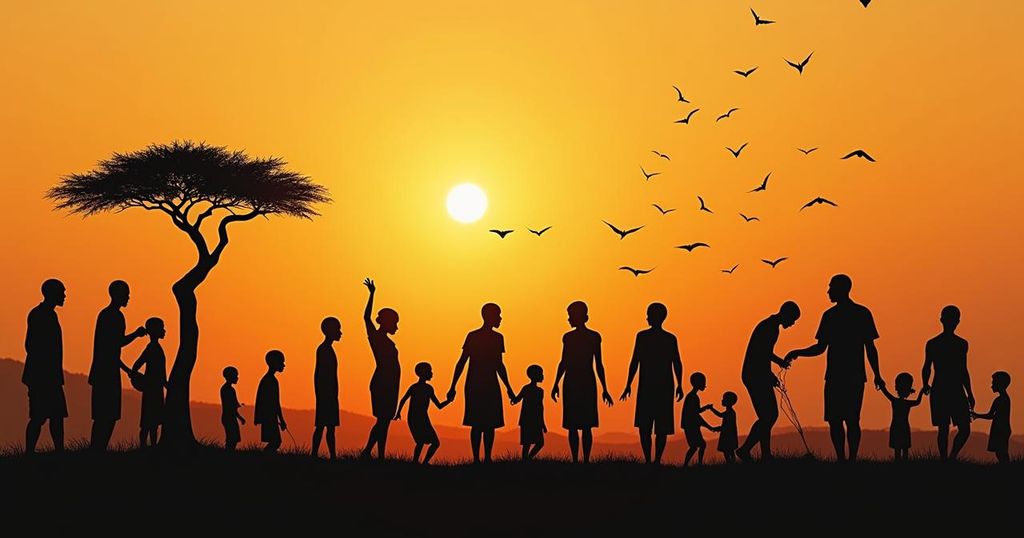Tanzanian communities are combatting the severe impacts of climate change through a UNEP-led initiative that enhances water access, restores ecosystems, and promotes sustainable livelihoods. Cattle farmer Asherly William Hogo exemplifies the benefits of this project, which has provided solar-powered water sources and training in resilient practices. Amidst escalating drought and flooding, this comprehensive project aims to support rural families and mitigate climate vulnerabilities through innovative strategies and international collaboration.
In the heart of Tanzania’s Dodoma region, communities are taking significant steps to confront the challenges posed by climate change, particularly escalating drought conditions. For cattle farmer Asherly William Hogo, aged sixty, the relentless pursuit of water for his livestock had defined much of his life. Hogo recalls arduous journeys in his childhood, often traveling great distances at night to find water for his herd. However, the installation of a solar-powered borehole and a large rainwater reservoir in his village of Ng’ambi has revolutionized their water access, allowing residents to enjoy year-round supply without the exhausting treks of the past. This initiative forms a crucial part of a broader effort spearheaded by the Office of the Vice President of Tanzania in partnership with the United Nations Environment Programme (UNEP). Since 2018, this project, funded by the Global Environment Facility, has been instrumental in providing for tens of thousands of rural residents by enhancing water supplies, promoting savings, and equipping farmers with sustainable livelihoods, including skills in beekeeping. The urgency of this project has been heightened by the detrimental effects of climate variability in Tanzania, which has disrupted familiar weather patterns. The situation became particularly dire in April, when the region faced severe drought conditions leading to extensive crop failures and livestock deaths, which were countered by an unusual influx of heavy rainfall that resulted in devastating floods. UNEP’s Head of Adaptation and Resilience Branch, Mirey Atallah, emphasized the need for immediate action, stating, “This year is the biggest wake-up call we have seen in Tanzania in terms of what climate change is doing to rural families. We need fast action on mitigation and adaptation. Otherwise, it won’t only be the climate that is breaking down but also the communities themselves.” In response to these pressing challenges, UNEP, alongside the Tanzanian government and the Global Environment Facility, has dedicated the past seven years to assisting local communities in adapting to changing weather patterns through community-led land use planning. UNEP’s Atallah noted the importance of integrated approaches for climate resilience that incorporate natural ecosystems alongside built structures. The implementation of this project has involved drilling 15 boreholes, most of which are solar-powered, and establishing earthen dams designed to capture over 3 million cubic meters of rainwater, benefiting more than 35,000 individuals across five districts. Moreover, the project places a strong emphasis on environmental restoration and sustainable livelihoods. Over 350,000 trees have been planted as part of efforts to reclaim degraded forests and stabilize riverbanks, essential for maintaining the water cycle. Community members, particularly women, have been trained in various income-generating activities, such as beekeeping and sewing, providing them with new avenues of livelihood that soften the blow of adverse climatic conditions. As stated by UNEP’s Atallah, “By diversifying income sources, the project has provided a safety net against the volatility of climate change. Now when extreme weather decimates farmland, families have other alternatives to fall back on.” The Tanzanian Minister of State, Selemani Jafo, commended the cooperative efforts of leaders and citizens in advancing the project’s goals, while community members like May Samwel Masulu have expressed pride in acquiring skills that challenge traditional gender roles. The project is set to deliver substantial benefits for approximately 3,800 households by the conclusion of its initiative in December 2024, demonstrating a transformative approach to building resilience against climate change.
The article discusses the efforts of Tanzanian communities in the Dodoma region as they adapt to the increasing challenges of climate change, particularly drought and erratic rainfall. With the guidance and support from the Tanzanian government and UNEP, a comprehensive project has been initiated to improve water access, restore local ecosystems, and provide sustainable livelihood options for rural families. The context is framed by recent climate-induced disasters that necessitate urgent and multidimensional adaptation strategies to safeguard these vulnerable communities.
In summary, the article highlights Tanzania’s proactive measures to combat the adverse effects of climate change, particularly through community empowerment initiatives that enhance water accessibility, restore natural ecosystems, and promote sustainable livelihoods. These efforts are critical for building resilience in rural areas reliant on agriculture, thereby mitigating the impacts of extreme weather events stemming from climate change. The project exemplifies how integrated approaches can aid vulnerable populations and set a precedent for similar initiatives globally.
Original Source: www.unep.org







